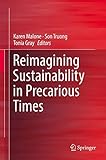Reimagining Sustainability in Precarious Times / edited by Karen Malone, Son Truong, Tonia Gray.
Material type: TextPublisher: Singapore : Springer Singapore : Imprint: Springer, 2017Edition: 1st ed. 2017Description: xix, 326 pages : 76 illustrations ; 24 cmContent type:
TextPublisher: Singapore : Springer Singapore : Imprint: Springer, 2017Edition: 1st ed. 2017Description: xix, 326 pages : 76 illustrations ; 24 cmContent type: - text
- computer
- online resource
- 9789811025501
- 306.43 MAL 23 TESF007
| Item type | Current library | Call number | Status | Date due | Barcode |
|---|---|---|---|---|---|
 Book
Book
|
Indian Institute for Human Settlements, Bangalore | 306.43 MAL TESF007 (Browse shelf(Opens below)) | Available | TESF007 |
Browsing Indian Institute for Human Settlements, Bangalore shelves Close shelf browser (Hides shelf browser)

|

|

|

|

|

|

|
||
| 306.43 BAK TESF028 The schooled society : the educational transformation of global culture / | 306.43 EDU 013189 Education, space and urban planning : | 306.43 ILL 000470 Deschooling society / | 306.43 MAL TESF007 Reimagining Sustainability in Precarious Times / | 306.43 SHA 013460 Sociological foundations of education, | 306.43 UNF 005108 Unfolding learning societies : | 306.430941 HAR TESF067 Aspiration, education and social justice : applying Sen and Bourdieu / |
Section 1 Responding to the Anthropocene -- Chapter 1 Sustainability, Education, and Anthropocentric Precarity -- Chapter 2 The Anthropocene's Call to Educational Research -- Chapter 3 Alternative Paradigms for Sustainability: Decentring the Human without becoming Posthuman -- Chapter 4 Cosmopolitics of Place: Towards Urban Multispecies Living in Precarious Times -- Section 2 Re-configuring and Re-worlding -- Chapter 5 Romancing or Re-configuring nature? Towards Common Worlding Pedagogies -- Chapter 6 A Precarious Body -- Chapter 7 Bodyplacetime: Painting and Blogging 'Dirty, Mess' Humannatured Becomings -- Chapter 8 Tracing Notions of Sustainability in Urban Childhoods -- Chapter 9 Beyond Sustainability: New Visions of Human Econnection in Early Childhood Education -- Chapter 10 Transnational Knowledge Exchange: Connecting Knowledge Traditions for Sustainability of the Planet -- Section 3 Re-reading and Grappling -- Chapter 11 Ecological Posthumanist Theorising: Grappling with Child-Dog-Bodies -- Chapter 12 Connections, Compassion, and Co-Healing: The Ecology of Relationships -- Chapter 13 Exploring 'Thing-Power' and the 'Spectre of Fear' on Schooling Subjectivities: A Critical Posthuman Analysis of LGBT Silencing -- Chapter 14 Re-thinking Human-Plant Relations by Theorising Using Concepts of Biophilia and Animism in Workplaces -- Chapter 15 Deep Mapping Towards and Intercultural Sustainability Discourse -- Section 4 Re-presenting and re-presencing -- Chapter 16 Expanding Curriculum Pathways between Education for Sustainability (EfS) and Health and Physical Education (HPE) -- Chapter 17 Watery Configurations of Animals, Children, Pedagogies, and Politics in a Suburban Wetland -- Chapter 18 The Ecological Curriculum: Teaching, Learning, Understanding -- Chapter 19 Nurturing Female Outdoor Educators: A Call for Increased Diversity in Outdoor Education in Precarious Times -- Chapter 20 Caretakers and Undertakers: How can Education Support Humanity to Build a Sustainable Future? -- Chapter 21 Educating Beyond the Cultural and the Natural: (Re)Framing the Limits of the Possible in Environmental Education.
This book reflects the considerable appeal of the Anthropocene and the way it stimulates new discussions and ideas for reimagining sustainability and its place in education in these precarious times. The authors explore these new imaginings for sustainability using varying theoretical perspectives in order to consider innovative ways of engaging with concepts that are now influencing the field of sustainability and education. Through their theoretical analysis, research and field work, the authors explore novel approaches to designing sustainability and sustainability education. These approaches, although diverse in focus, all highlight the complex interdependencies of the human and more-than-human world, and by unpacking binaries such as human/nature, nature/culture, subject/object and de-centring the human expose the complexities of an entangled human-nature relation that are shaping our understanding of sustainability. These messy relations challenge the well-versed mantras of anthropocentric exceptionalism in sustainability and sustainability education and offer new questions rather than answers for researchers, educators, and practitioners to explore. As working with new theoretical lenses is not always easy, this book also highlights the authors' methods for approaching these ideas and imaginings. "The book definitely makes an original contribution to the field. Most of the published work related to sustainability in science education does not draw on posthumanism, new materialism or feminist philosophies. I think this book is unique in its use of these theoretical constructs to make sense of sustainability practices in a range of diverse contexts. I think there is an urgent need for this book in the academic community and beyond." Deborah Tippins, University of Georgia, College of Education .


There are no comments on this title.